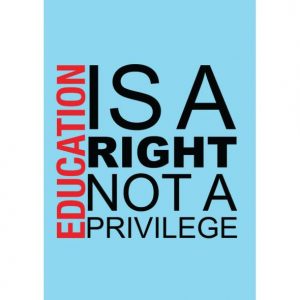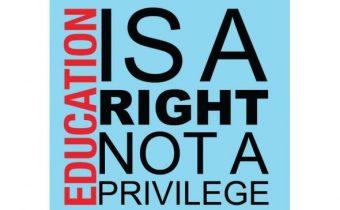
For Detroit children, is Literacy a Right or a Responsibility?
By Nedra Robinson
Detroit, the heart of the American automotive industry, the birthplace of Motown, and in recent years, a city recovering from bankruptcy. Its employment base and once-thriving middle class are now gone. Consequently, the renowned city is under fire for its dismal education system. According to the 2015 National Assessment of Educational Progress (NAEP) tests published by the Department of Education’s National Center for Educational Statistics, approximately 5 percent of Detroit’s students are proficient in math and reading. Detroit Public Schools is the epitome of failing urban education.
On Tuesday, September 13, 2016 seven students, listed pseudonyms, filed a class action lawsuit against Michigan Governor Rick Snyder, the state Board of Education, state school Superintendent Brian Whiston, David Behen, director of the Michigan Department of Technology, Management and Budget, and Natasha Baker, the state school reform officer. The students are represented by a large pro bono law firm in California, and they are seeking a legal right to literacy under the 14th Amendment
School Demographics
The lawsuit was filed on behalf of students who attended many of Detroit’s lowest-performing schools.
- Cody Medicine and Community Health Academy
- Experencia (charter school that closed in June) – Approximately, 10 percent of Experencia third graders scored at the proficient level or higher on the State of Michigan’s 2015-16 English assessment test
- Hamilton Academy – Approximately, 4 percent of Hamilton third graders scored at the proficient level or higher on the State of Michigan’s 2015-16 English assessment test
- Osborn Collegiate Academy of Mathematics, Science and Technology
- Osborn Evergreen Academy of Design and Alternative Energy
It’s worth noting that 46 percent of third graders scored proficient or higher statewide.
Quality Education: A Right or a Responsibility
According to the National Institute for Literacy, approximately 50 percent of Detroit’s adults are functionally illiterate. Provided this information, it would seem that acquiring literacy skills and quality education would be a top priority. Surprisingly, that is not the case. The United States is one of few industrialized nations that does not guarantee the right to education in its constitution. In 1973, the U.S. Supreme Court determined that public education is not a fundamental right, and the federal government’s sole role in education is to provide funding. Furthermore, Michigan’s Assistant Attorney General, Timothy J. Haynes, filed a 62-page motion requesting that a federal judge dismiss the lawsuit citing that there is not fundamental right to literacy and Michigan’s Constitution only requires the state to provide the infrastructure for education.
Baffling!
In my opinion, it’s absurd that a portion of residents’ property taxes are used to fund schools, yet they are not receiving an adequate return on their investment. And to exert that there’s no fundamental right to education or literacy when Michigan law states that for children between the age of 6 to 18 “attendance shall be continuous and consecutive for the school year fixed by the school district in which the child is enrolled. In a school district that maintains school during the entire calendar year …” What is the purpose of children being enrolled in school? It’s asinine that parents are required to send their children to school, yet the state has no fundamental obligation to provide a quality education for ALL children.
(Excerpt is taken from page 31 of the Class Action Complaint)
Furthermore, Detroit’s population and its schools are majority black. Mark Rosenbaum, the plaintiffs’ attorney said, “Absent literacy, a child has no way to obtain knowledge, communicate with the world, or participate in the institutions and activities of citizenship.” Thus, I can’t help but draw correlations between Michigan’s inability to provide DPSCD students the same access to education as their peers throughout the state and anti-literacy laws that existed during slavery to maintain a subservient class.
The denial of access to literacy to a discrete group of students demeans and excludes them, resulting in separate and unequal schooling that “generates a feeling of inferiority as to their status in the community that may affect their hearts and minds in a way unlikely to ever be undone.” Brown, 347 U.S. at 494 (1954)
The social costs due to low literacy skills far exceed the cost to educate a child properly.
Equal Protection of the Laws
The 13th, 14th, and 15th amendments were added to the U.S. Constitution after the Civil War to ensure equality for blacks in America.
The suit recognizes that education may not be a fundamental right under the Constitution; however, the attorneys are asserting that the equal protection clause of the 14th Amendment ensures that no child living in a state with a public school system be denied equal access to schooling. Unfortunately, relying on the 14th Amendment for equal protection hasn’t provided educational equality in the past.
Unfortunately, this is not the first lawsuit filed for the “right to read”. In 2012, the American Civil Liberties Union of Michigan filed a complaint against the state, not U.S., Constitution. The ACLU argued that the State of Michigan and the Highland Park School District were violating state law by allowing students to fall far behind in basic literacy skills.
The capacity to learn is deeply rooted in the ability to achieve literacy. A child who cannot read will be disenfranchised in our society and economy for a lifetime. – Kary L. Moss, executive director of the ACLU of Michigan
Sadly, the Michigan Court of Appeals judges ruled against the ACLU in 2014, stating that the state Constitution only requires the Legislature to finance public schools, and the delivery of education services is left up to the local districts.
Again, whose responsibility is it to provide equal access and quality education?
We can only hope that the outcome of this case will fare better than the ACLU’s and set a precedent in requiring states and local districts to adequately educate ALL of their students because not doing so will lead to dire circumstances.
Decades of State disinvestment in and deliberate indifference to the Detroit schools have denied Plaintiff schoolchildren access to the most basic building block of education: literacy. Literacy is fundamental to participation in public and private life and is the core component in the American tradition of education. But by its actions and inactions, the State of Michigan’s systemic, persistent, and deliberate failure to deliver instruction and tools essential for access to literacy in Plaintiffs’ schools, which serve almost exclusively low-income children of color, deprives students of even a fighting chance.
Nedra Robinson is an education consultant dedicated to student equity and closing the achievement gap. She holds a Bachelor of Arts in Sociology and a Master of Public Administration both from the University of Texas at Arlington. She has over 15 years of experience in education and she is a former political staffer. Check out her blog, Educate to Liberate, for articles that cover challenges impacting education and the achievement gap due to social/political issues, public/education policy, and community/economic development.




